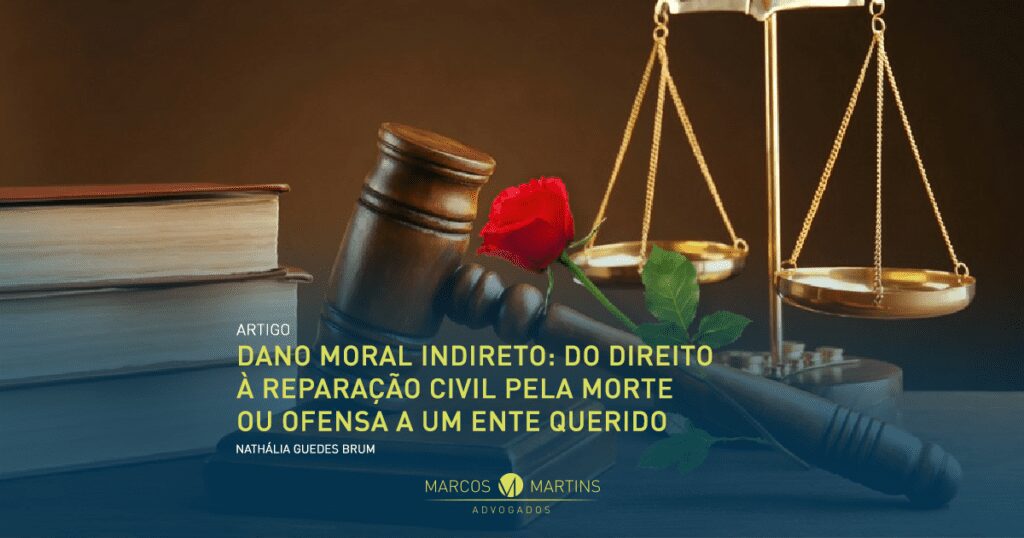Nathália Guedes Brum
Lawyer at Marcos Martins Advogados Associados
Indirect, reflex or ricochet moral damage is damage caused to a third party as a result of the death or offense of a person very close to them, when the harmful effects affect them reflexively, giving rise to the right to civil reparation for the damage experienced.
Despite the very personal nature (non-transferable to another person) of moral damage, the jurisprudence of the Higher Courts understands that the pain and suffering resulting from the unlawful act affects not only the victim of the damage, but also third parties with emotional ties to them.
It should be noted that for the duty to compensate to exist, it is essential to prove the damage, which can affect both the material and off-balance sheet spheres of the individual.
It is necessary to clarify that if the deceased was harmed while alive, their personality rights would be damaged and the right to compensation for moral damage would be passed on in the inheritance, as set out in article 943 of the Civil Code[1], and the heirs would thus be entitled to procedural substitution, under the terms of article 43 of the Code of Civil Procedure[2].
Although article 403 of the Civil Code[3] establishes that compensation is only possible for direct and immediate damage, which would consequently exclude indirect or ricochet damage, this is not the understanding adopted by case law and this article is only applied to cases of property damage.
The legitimacy of bringing an action for compensation for indirect moral damage and the amount of compensation to be set are still the subject of disagreement in case law, and it is necessary to avoid an “infinite condemnation”.
According to the opinion of the rapporteur of AREsp 1.290.597[4], Justice Lázaro Guimarães, the Superior Court of Justice (STJ) has considered any relative in a direct or collateral line up to the fourth degree to be a legitimate party to bring an action for compensation for moral damages by reflex.
However, the rapporteur of REsp 1.076.160[5], Justice Luís Felipe Salomão, pointed out the fact that there are various family arrangements, which results in the need to analyze the specific case to determine any right to compensation:
It should be emphasized that the right to compensation, in view of the peculiarities of the specific case, may be open to the most diverse family arrangements, and the judge must assess whether the particularities of each nuclear family justify extending it to other subjects who are part of it; likewise, in each hypothesis to be judged, the prudent discretion of the judge will assess the total compensation for the family nucleus, without excluding the various legitimates indicated.
Some more conservative judgments, such as REsp 1.076.160[6], observe the order of hereditary vocation to assess active legitimacy, with exceptions for exceptional cases. In this case, the Fourth Chamber held that the fiancé had no legal standing to bring an action for compensation for indirect moral damages as a result of the death of his fiancée, especially when the victim’s parents had already brought a successful action for reparation, in which case the subjective limitation of the beneficiaries was paramount.
On the other hand, the Fourth Panel of the STJ also held, during the judgment of REsp 1.095.762 [7], that parents have the right to claim moral damages for ricochet due to the death of their child, even if the child is of legal age and has a settled family, and must delimit the amount of compensation.
Another important point on the subject is thatthere is no need for economic dependence between the victim and the person claiming compensation for indirect damage, since compensation for moral damage does not have a patrimonial nature, and it is only relevant if the claimant suffered the event intimately.
Although indirect moral damage is normally used in cases of the death of a loved one, it can also occur when the latter survives the harmful effect, as was the case in REsp nº 876.448[8], in which a university was ordered to pay the victim, her parents and siblings compensation for moral damage, because she was shot by a stray bullet inside the institution and became a quadriplegic, on the grounds that if the direct victim survives, her incapacity could cause damage to others.
When it comes to setting the amount due for moral damage by ricochet, a certain amount of caution is necessary, because as the active legitimacy can be broad, the ceiling for compensation for the same damaging event must be limited. It is necessary to establish a quantitative and a subjective limitation, so that the person causing the damage is not liable for unlimited damages.
In this regard, Justice Luís Felipe Salomão, reporting on REsp 1.076.160[9], points out that:
In fact, the current civil liability system rejects unlimited indemnities that reach amounts which, under the pretext of fully compensating victims of unlawful acts, reveal a clear disproportion between the agent’s conduct and the results ordinarily expected from it. And, of course, this exaggeration or disproportion of the compensation would be present if there were not – in addition to a quantitative limitation of the condemnation – a subjective limitation of the beneficiaries. Granting broad and unrestricted legitimacy to all those who, in some way, have borne the pain of losing someone – such as countless people outside the victim’s family – means imposing on the obligor an equally unlimited duty to repair a damage whose extent is always disproportionate to the act that caused it.
Thus, in order to avoid disproportionality between the agent’s conduct and the damage caused, the STJ has, in most cases, set the amount of compensation per family nucleus.
In the meantime, although it is not provided for in our legal system and is clearly subjective in nature, indirect moral damage is recognized by the courts and makes it possible for the agent to be held civilly liable, as long as the damage to the indirect victim is proven.
[1] Art. 943. The right to demand compensation and the obligation to provide it pass with the inheritance. (BRASIL. Lei 10.406, de 10 de janeiro de 2002. Código Civil.)
[Art. 43. In the event of the death of any of the parties, they shall be replaced by their estate or by their successors, subject to the provisions of art. 265. (BRAZIL. Law 13.105, of March 16, 2015. Code of Civil Procedure.)
[3] Art. 403. Even if the non-performance is the result of intent on the part of the debtor, losses and damages shall only include actual losses and profits lost as a direct and immediate result thereof, without prejudice to the provisions of procedural law. (BRAZIL. Law 10.406, of January 10, 2002. Civil Code)
[4] STJ. AgInt no Agravo em Recurso Especial nº 1.290.597 – RJ (2018/0105579-0). Rel. Min. Lázaro Guimarães (Recalled Judge of the TRF 5th Region). Fourth Panel. Date of Judgment: 20/09/2018. Publication Date: DJe 26/09/2018.
[5] STJ. Special Appeal No. 1.076.160 – AM (2008/0160829-9). Reporting Justice Luís Felipe Salomão. Fourth Panel. Judgment Date: April 10, 2012. Publication Date: DJe 21/06/2012.
[6] STJ. Special Appeal No. 1.076.160 – AM (2008/0160829-9). Reporting Justice Luís Felipe Salomão. Fourth Panel. Date of Judgment: 20/03/2012. Publication Date: DJe 21/06/2012.
[7] STJ. Special Appeal No. 1.095.762 – SP (2008/0215461-5). Reporting Justice Luís Felipe Salomão. Fourth Panel. Date of Judgment: 02/21/2013. Publication Date: DJe 11/03/2013.
[8] STJ. Embargoes of Divergence in Special Appeal No. 876.448 – RJ (2011/0066360-0). Rel. Min. Raul Araújo. Third Panel. Date of Judgment: 04/28/2011. Publication Date: DJe 06/05/2011.
[9] STJ. Special Appeal No. 1.076.160 – AM (2008/0160829-9). Reporting Justice Luís Felipe Salomão. Fourth Panel. Date of Judgment: 20/03/2012. Publication Date: DJe 21/06/2012.








